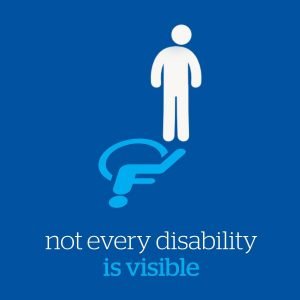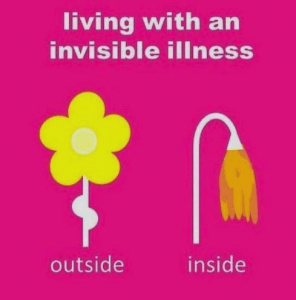In elementary school, we are taught that it’s not right to judge a book by its cover. Just because the cover art on the book wasn’t appealing doesn’t mean the book itself wasn’t a bestseller. The same goes for when you meet someone new. It’s better to get to know someone personally before forming an opinion rather than judging someone solely based off their looks.
What is an invisible illness?
The term “invisible chronic illnesses and disabilities” refers to chronic diseases and disabilities that don’t necessarily affect your appearance, but they do significantly affect your body’s ability to do normal daily activities. There is no shortage of invisible illnesses, such as asthma, diabetes, chronic pain syndrome, arthritis, depression, fibromyalgia, immune deficiencies and Crohn’s disease, just to name a few.
There is no shortage of invisible illnesses, such as asthma, diabetes, chronic pain syndrome, arthritis, depression, fibromyalgia, immune deficiencies and Crohn’s disease, just to name a few.
Because identifying invisible conditions isn’t easy, it’s not uncommon for people to be accused of faking or imagining symptoms just because what they are feeling isn’t visually apparent. It shouldn’t take symptoms of these conditions such as inflammation, digestive issues, breathing problems, chemical imbalances, or blood sugar levels to be taken seriously.
Just because someone looks good on the outside doesn’t mean they are feeling well on the inside. Not being believed is one of the most frustrating aspects of having an invisible disease.
Being judged by appearances
I’ve experienced firsthand how it feels to be accused of faking my disability because I didn’t “appear” to have a handicap. This happened in 2003. I was suffering from severe asthma, so bad there were times I was dependent on wearing supplemental oxygen. One day I went out to a store with my mother and used my handicap placard to use a handicap parking space.
As we were leaving the store, a woman pulled up with her car behind ours and started yelling how handicap parking is for people who are physically handicapped. My mother explained to the woman that I had a handicap placard because I was disabled. She looked over to me and said, “obviously its not a physical disability.” I couldn’t believe she was actually insinuating my problem was a mental handicap. I couldn’t believe her audacity. This is a perfect example of how judging someone by appearances isn’t always accurate.
What about Crohn’s?
Crohn’s disease definitely falls in the category of being an “invisible disease” that can be extremely debilitating. It’s important to know that no two cases of Crohn’s are the same. The degree of how disabled someone is depends on how controlled their Crohn’s is. Patients who respond well to medications have a good chance of achieving remission.
When someone with Crohn’s is in remission, they usually have minimal symptoms and are able to do most activities. However, when Crohn’s disease is not under control, experiencing frequent flares is common and can be very debilitating. It is important to understand that where one medication works for someone, it may not work for others.
Years ago there weren’t very many treatment options available for Crohn’s disease. With more recent additional research, better medications showing better success have become available. Don’t be discouraged if one treatment doesn’t work — there are often more combinations to try. With all of the difficulties associated with having Crohn’s disease, including the stress of it being an invisible disease, it’s no wonder this condition not only affects the body physically, but emotionally as well.
***
Note: IBD News Today is strictly a news and information website about the disease. It does not provide medical advice, diagnosis, or treatment. This content is not intended to be a substitute for professional medical advice, diagnosis, or treatment. Always seek the advice of your physician or other qualified health provider with any questions you may have regarding a medical condition. Never disregard professional medical advice or delay in seeking it because of something you have read on this website. The opinions expressed in this column are not those of IBD News Today or its parent company, BioNews Services, and are intended to spark discussion about issues pertaining to inflammatory bowel disease.

